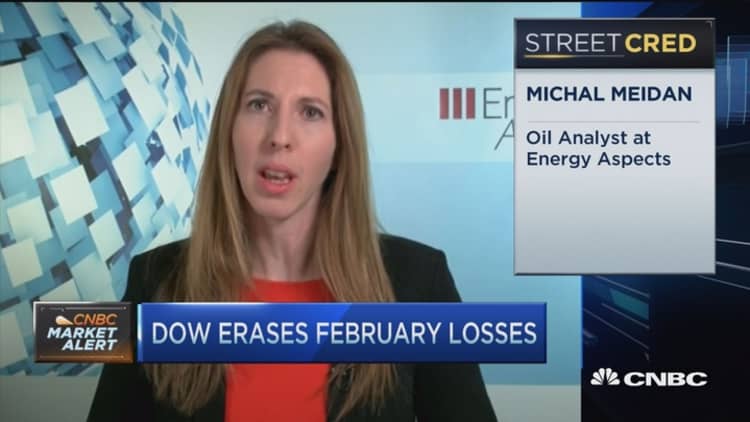Talks between major oil producers about freezing output shows how painful cheap crude has become, but it is not likely to bring an end to the world oil glut anytime soon.
Analysts caution that the situation is fluid and the outcome still very uncertain, particularly since Iran has not seemed to have definitively agreed to anything. That country has been the wild card for the oil industry, since it is bringing crude back to the already oversupplied market now that sanctions against its nuclear program have been lifted.
"This is a selling opportunity ... think what the market is rewarding is they had a meeting and it was civil. They all said the right thing. This is a potential first step. If they agree on this, will they agree on a production cut? They need to," said John Kilduff, partner at Again Capital.

Saudi Arabia and Russia surprised the market by striking a possible deal to freeze output in what would be the first coordinated move to contain global supply since OPEC first announced plans in November 2014 to let the market set prices. West Texas Intermediate crude surged more than 5 percent Wednesday, as traders took comments from Iran to mean it agreed with the deal.
Read MoreOil surges 5.6 percent on expectations of deal
The Organization of the Petroleum Exporting Countries is not a party to the preliminary agreement but some of its members are, including Qatar and Venezuela. The accord depends on other producers holding output steady. OPEC meets in June, and some analysts believe it may now be more open to cutting back on production.
"I think June's in play," said Helima Croft, chief commodities strategist at RBC Capital Markets. Croft said it will be more clear how much supply overhang there is by then, and there should also be more clarity in terms of the U.S. industry's output. "At that point, you will know the trajectory of the U.S."
But Ed Morse, Citigroup's global head of commodities research, does not expect any accord on the part of OPEC and does not see much impact from the producers' agreement.
Read MoreThe importance of oil and stocks correlation
"It's an agreement in case the impossible happens. It's a totally free ride. It had its moment of pulling up the oil price. The probability is so incredibly low and the Saudis know that. That's why they're willing to meet with the Venezuelans ... and to meet with the Russians," he said.
Morse said while some producing countries are desperate and companies are also desperate, Saudi Arabia is not. He does not expect an OPEC deal, but said if there was a resolution of geopolitical issues that might change the dynamic.
"The plausibility of that (OPEC accord) is low, with one possible exception. That is that the Saudis indicated if the right kind of deal was made in the Middle East involving changes in the government in Syria and changes in the military positions of Russia and Iran, they would consider making a contribution to higher oil prices," Morse said.
Under the possible agreement to cap production, producers would maintain January's output level. But that also poses a problem since Russia was pumping at a post-Soviet Union high of about 10.8 million barrels a day and Saudi Arabia was producing about 10.2 million barrels a day.
Iran has said it could bring back 500,000 barrels a day to the market immediately and 500,000 barrels later on. But so far, Iran may have delivered an estimated 280,000 to 300,000 a day from floating storage, Croft said.
Read MoreEarly signs of oil capitulation
Iranian Oil Minister Bijan Zanganeh met with ministers from Venezuela, Qatar and Iraq on Wednesday but he did not confirm the country would freeze production. Zanganeh said the production cap should be a first step toward stabilizing the market. Meanwhile, Mehdi Asali, Iran's envoy to OPEC, was quoted earlier as saying it would be illogical for Iran to freeze oil production.
Morse said the Iranians did not make much of a commitment at all. "I thought that was diplomatic speak. Denied by somebody while made positive by somebody else. I don't make anything of this other than noise," he said.
Iran also has internal political considerations, and analysts said it would be unlikely to see it agree to any detailed announcement of production caps that may not play well at home.
"Zanganeh is of course constrained by the fact that Iran is having an election on the 26th of February, and to say something very controversial would be very unlikely," said Bhushan Bahree, senior director at IHS Energy.
"I think what it shows is that below $30, all of these oil exporters are very uncomfortable with price levels and they were trying to change at least the market perception that things could carry on, continuing to go down," said Bahree.
Croft said even if it doesn't mean an accord is coming the discussions are important. "For the Russians and the Saudis, the two big heavyweights to come out, and say they're going to freeze production … that's a real big change in message," she said.


